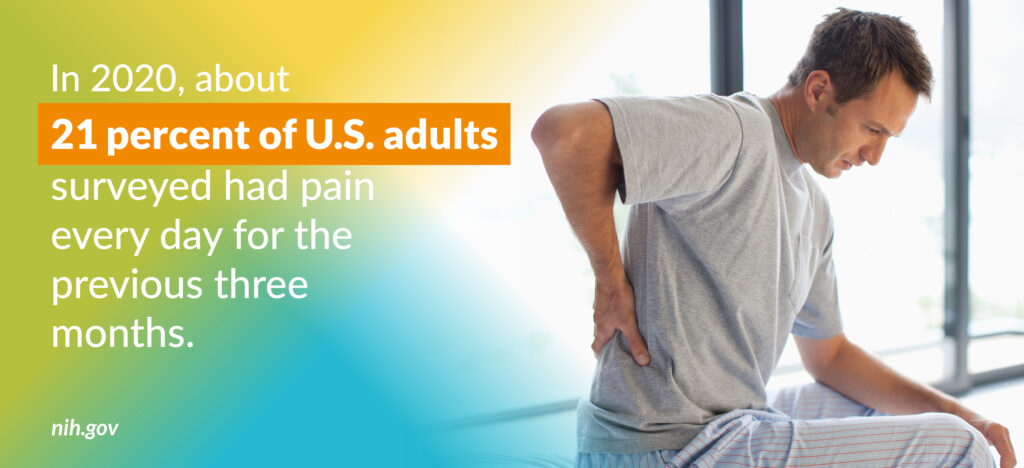Medically reviewed by Padma Gulur, MD, September 9, 2025.
Chronic Pain
More than 100 million American adults suffer from chronic pain, according to the Institute of Medicine. Chronic pain — pain that doesn’t go away — can take over your life. It can make you miss work, keep you awake at night, hold you back from leisure activities, and even keep you from eating properly. And, it can affect relationships with friends and family.
What is chronic pain?
Most pain goes away. You recover from surgery. Your toothache gets treated. Your sprained ankle heals. That occasional headache responds to aspirin. These are examples of acute, or temporary, pain. Chronic pain is pain that won’t go away, lasting three months or longer. Examples include arthritis in your knees, back, or neck that hurts most days; frequent migraine headaches; surgical pain that isn’t treated properly and lingers; and pain from muscle injuries that don’t heal correctly.
Other common causes of chronic pain are:
- Back and neck injuries
- Fibromyalgia and musculoskeletal pain
- Phantom limb pain (experienced by those who have had a limb amputated)
- Shingles
Who treats chronic pain?
Pain treatment is complex and can cause more harm than good if it is not provided by a physician with specific training in pain management. Just as there are physicians who specialize in treating conditions such as cancer, heart disease, or allergies, there are physicians who specialize in treating pain.
These physicians complete four years of medical school and further training in a specialty, such as anesthesiology, physical medicine and rehabilitation, psychiatry, or neurology, followed by an additional year of training to become an expert in chronic pain. Be sure your specialist is certified in a pain medicine subspecialty by a member board of the American Board of Medical Specialties, such as the American Board of Anesthesiology.
Pain treatment is complex and can cause more harm than good if it is not provided by a physician with specific training in pain management.
While you may know that anesthesiologists manage pain before, during, and after surgery, you may not realize that some specialize in managing chronic pain. In fact, decades of research by anesthesiologists have led to the development of more effective treatments for chronic pain.
This specialized training and expertise is essential: The spine and nerves that register pain are delicate, and everyone’s anatomy and pain tolerance are different. Pain medicine specialists are also experts in using a wide variety of medications, which can effectively alleviate pain for some patients.
Anesthesiologists are medical doctors who specialize in anesthesia, pain management, and critical care medicine. While all anesthesiologists know how to treat pain, some choose to specialize in pain medicine and are especially skilled and experienced in taking care of people with chronic pain. If you suffer from chronic pain, consider seeing an anesthesiologist who specializes in pain medicine.
How is chronic pain diagnosed?
The pain medicine specialist will work with you and any other physicians, such as your primary care physician, surgeon, or oncologist, depending on the source of your pain. While other physicians manage and treat your medical conditions such as arthritis or cancer, the pain medicine specialist is in charge of diagnosing and treating your pain.
Here are some things a pain medicine specialist may do:
- Review your medical records, X-rays, and other images.
- Perform a complete physical examination.
- Ask you to describe your pain, explain where it hurts, how long it has hurt, and what makes the pain feel better or worse.
- Request the completion of a detailed questionnaire about the impact your pain is having on your life, how it interferes with your daily activities, and what your treatment goals are.
- Order tests for diagnosis and treatment.

What are the options for treating chronic pain?
If you’re one of the millions of people who suffer from chronic pain, talk to your pain medicine specialist about treatment options, including:
- Medication – Over-the-counter remedies, such as acetaminophen and nonsteroidal anti-inflammatory drugs (NSAIDs), and more powerful drugs, such as opioids, may help ease your pain. Other medications can help too, including antidepressants, anti-seizure medications, and steroids. Your physician may suggest a combination of medications to address different aspects of your pain. Because some of these medications, such as opioids, can be addictive, and other medications can cause side effects or interact with each other, it’s important that a qualified pain medicine specialist manages your medication plan.
- Physical therapy – Some types of pain respond well to physical therapy, specific exercises that help build up or stretch muscles and ease pain. Your pain medicine specialist can work with a physical therapist, orthopedic surgeon, or physical medicine specialist to prescribe a physical therapy program.
- Medical procedures – A number of procedures can help with pain control, including nerve blocks, surgery, and snipping overactive nerves. Extensive research is being done to develop high-tech techniques to block or minimize pain using radio waves, electrical currents, or medication pumps.
- Complementary therapies – Some people find relief using biofeedback, relaxation, meditation, acupuncture, visualization, or other alternative therapies.
- Lifestyle changes – You can help manage your pain by being as healthy as possible. If you smoke, get help so you can quit. Try to maintain a healthy weight to avoid the stress excess weight puts on painful hips and knees. Good nutrition is important, and exercising can often relieve or prevent pain.
What are some of the special challenges of chronic pain?
People who are in pain may not be able to fully engage in work or enjoy life. And some people with chronic pain develop another problem that can be even more serious than the pain itself — opioid addiction. More than 300 million prescriptions are written every year for opioids, and 2 million Americans abuse these powerful painkillers. While opioids can be very effective at treating pain, they are extremely addictive, especially when used over a long period of time. This is why opioids should be used only with the supervision of a physician who understands how they work and how they can be used safely.
